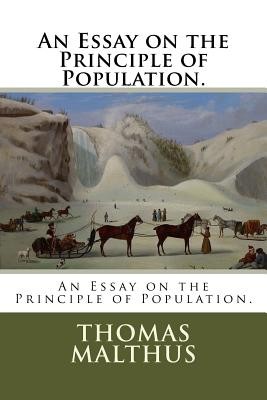
- We will send in 10–14 business days.
- Author: Thomas Malthus
- Publisher: CreateSpace Independent Publishing Platform
- ISBN-10: 1985822954
- ISBN-13: 9781985822955
- Format: 15.2 x 22.9 x 1.2 cm, minkšti viršeliai
- Language: English
- SAVE -10% with code: EXTRA
Reviews
Description
Thomas Robert Malthus 13 February 1766 - 23 December 1834) was an English cleric and scholar, influential in the fields of political economy and demography.[2] Malthus himself used only his middle name, Robert. In his 1798 book An Essay on the Principle of Population, Malthus observed that an increase in a nation's food production improved the well-being of the populace, but the improvement was temporary because it led to population growth, which in turn restored the original per capita production level. In other words, mankind had a propensity to utilize abundance for population growth rather than for maintaining a high standard of living, a view that has become known as the "Malthusian trap" or the "Malthusian spectre". Populations had a tendency to grow until the lower class suffered hardship and want and greater susceptibility to famine and disease, a view that is sometimes referred to as a Malthusian catastrophe. Malthus wrote in opposition to the popular view in 18th-century Europe that saw society as improving and in principle as perfectible.[4] He saw population growth as being inevitable whenever conditions improved, thereby precluding real progress towards a utopian society: "The power of population is indefinitely greater than the power in the earth to produce subsistence for man".[5] As an Anglican cleric, Malthus saw this situation as divinely imposed to teach virtuous behaviour.
- Author: Thomas Malthus
- Publisher: CreateSpace Independent Publishing Platform
- ISBN-10: 1985822954
- ISBN-13: 9781985822955
- Format: 15.2 x 22.9 x 1.2 cm, minkšti viršeliai
- Language: English English
Thomas Robert Malthus 13 February 1766 - 23 December 1834) was an English cleric and scholar, influential in the fields of political economy and demography.[2] Malthus himself used only his middle name, Robert. In his 1798 book An Essay on the Principle of Population, Malthus observed that an increase in a nation's food production improved the well-being of the populace, but the improvement was temporary because it led to population growth, which in turn restored the original per capita production level. In other words, mankind had a propensity to utilize abundance for population growth rather than for maintaining a high standard of living, a view that has become known as the "Malthusian trap" or the "Malthusian spectre". Populations had a tendency to grow until the lower class suffered hardship and want and greater susceptibility to famine and disease, a view that is sometimes referred to as a Malthusian catastrophe. Malthus wrote in opposition to the popular view in 18th-century Europe that saw society as improving and in principle as perfectible.[4] He saw population growth as being inevitable whenever conditions improved, thereby precluding real progress towards a utopian society: "The power of population is indefinitely greater than the power in the earth to produce subsistence for man".[5] As an Anglican cleric, Malthus saw this situation as divinely imposed to teach virtuous behaviour.


Reviews